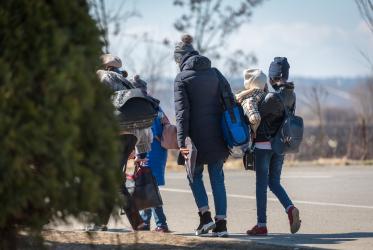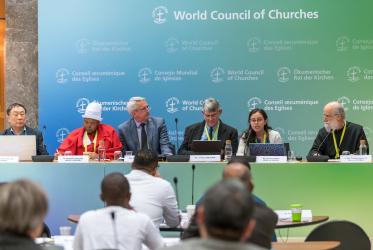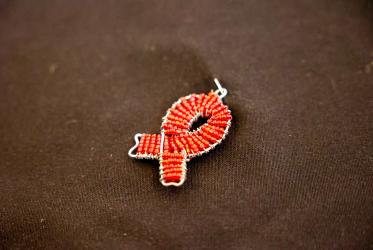The Nadi Declaration: a statement of the World Council of Churches' Pacific member churches on HIV/AIDS
Nadi, Fuji
29 March - 1 April 2004
"HIV/AIDS is here in the Pacific it has made its bed under our own family roofs. Maire Bopp (Dupont)
WHO WE ARE
We believe that the church as the body of Christ comprises family, youth, women, men, and children. Each complements the other; united in solidarity with Positive People1 we can work to overcome HIV/AIDS. As the church we have a unique role, as commanded by Jesus, to love all, to be a caring and healing community and to stop stigmatising and discriminating against Positive People.
Our Consultation brought together 36 people, most of who were from Pacific Island countries (Kiribati, French Polynesia, Niue, Marshall Islands, Solomon Islands, Fiji, Tuvalu, Vanuatu, Tonga, Samoa, American Samoa, New Caledonia, Papua New Guinea, and the Cook Islands).
This consultation had resource people from the Forum Secretariat, the regional office of UNAIDS and representatives of people living with HIV. Included among the Pacific representatives were pastors, youth workers, church representatives, the Pacific Conference of Churches' and the World Council of Churches' staff.
The consultation recognised the need for the churches to play a more pro-active role in efforts to minimise the impact of HIV/AIDS in the Pacific community by creating a more caring, nurturing and supportive environment.
During the consultation, the participants were advised about the Regional Strategy being developed by the Forum Secretariat, SPC, UNAIDS and other related agencies. The participants also noted that most countries have developed HIV/AIDS strategic plans. The crucial role of the church at both the national and regional levels in ensuring that these efforts are successful was emphasised. The participants took up the challenge and have agreed upon the importance of establishing a closer working relationship with those already engaged in the battle against HIV/AIDS.
The powerful testimonies of Positive People helped to improve our understanding of and crystallise the healing role of the church in the epidemic. We recognise that Positive People can mobilise the wider church community to act and become a more caring Christian community. We agreed that whenever possible, we link up and work with Positive People to address our churches, communities and hasten the process.
OUR CONTEXT
There are in excess of 9,000 reported HIV/ AIDS cases in a population of 6.6 million throughout 22 Pacific Island countries and territories. Current estimates could raise this figure to over 15,000 cases (for example in Papua New Guinea and Fiji). Women are the fastest growing group infected with HIV/AIDS in our region. Around the world, including the Pacific, 80 per cent of the women infected with HIV are not sex workers, nor are they promiscuous persons; most are married and in one-partner relationships.
-
Papua New Guinea has 7,500 reported cases out of 3 million population.
-
Over 200 HIV/AIDS reported cases in French Polynesia, New Caledonia and Guam.
-
Below 200 reported cases in Fiji.
-
Below 50 reported cases in Kiribati, Tonga, Tuvalu, Samoa, Marshall Islands, and the Federated States of Micronesia.
-
Below 10 reported cases in, American Samoa, Vanuatu, and the Solomon Islands.
-
0 reported cases in Pitcairn, Tokelau, Niue, Nauru, and the Cook Islands.
It is doubtful whether the numbers reflect the reality: There is:
-
Very low testing and screening of HIV across the Pacific.
-
Low to very low usage of condoms.
-
A high rate of sexually transmitted infections in Pacific communities.
-
High teenage pregnancy and
-
Large population mobility across the region.
IS THE PACIFIC A HIGH- OR LOWPREVALENCE REGION?
-
There are only 15 cases in Tuvalu, which is low, but when compared to the population Tuvalu (13,000) becomes a high prevalence country.
-
French Polynesia with 230+ cases to 230,000 people makes it an average prevalence territory.2
-
Fiji went from zero cases in mid to late 1990s to 130+ cases today; it is not high prevalence, but is fast growing.
-
Last year Vanuatu proudly reported zero cases, but did not report that they had no screening or testing in place.
-
A few months ago the Solomon Islands were still at zero, but now have two cases.
-
Testing facilities in many Pacific Island countries are not readily available to the general public.
These figures don't necessarily indicate that there are more infections today than before, but rather that there is more screening from which to gather data. A Pacific Island country can go from zero cases to a significant number in one year as a result of improved testing. At present, the Pacific Island countries' testing rates and their ability to respond to an epidemic are low, thus confirming the challenge of HIV/AIDS to the present medical infrastructures and financial capacities of our governments to address this epidemic.
Therefore, when addressing the churches of the Pacific, we address each and every Pacific Islander who makes up the church; what we do or do not do will have an impact both on our community's response to HIV/ AIDS, and our future.
THEOLOGICAL UNDERSTANDING OF HIV AIDS
Theological interpretation of the HIV/AIDS issue is crucial because it promotes the community's understanding of the issue on the basis of the values and the fundamental message of God's boundless LOVE and COMPASSION. This understanding assists the churches to use their networks that are present in all our Pacific societies to mobilise the community.
-
The isolation of Positive People and human insensitivity to the suffering caused by the disease is a distortion of the will of God.
-
Theological education assists the church to combat the misinterpretation of those biblical texts that are frequently used to oppress, exclude, persecute and stigmatize Positive People.
-
Theological understanding enables us to have a holistic approach to the issue and avoid becoming entangled in one-sided and imbalanced discussions that focus exclusively on sin, morality and HIV/AIDS.
-
Theological interpretation helps us to understand that the effects of HIV/AIDS are not only due to the consequences of personal action or inaction, but also to the neglect, irresponsibility and misdeeds of our communities and our churches.
We, the churches are encouraged to seek forgiveness from God and from Positive People, for not doing what we ought to have done, and for contributing to their pain and suffering. This will provide us with opportunities to heal our communities and liberate us to be a healing and reconciling community. It will also reaffirm our role as channels of the God given strength, to bring hope, succour and peace in the society.
We are committed to systematically incorporate the issue in our theological institutes to train and retrain our pastors and laity, thus empowering them to be instruments of God in addressing HIV/AIDS and making a difference in the lives our people.
We commit ourselves to discuss theological perspectives on HIV/AIDS and related topics of human sexuality regularly through newsletters, messages and publications in local languages.
We identify the need to promote, adapt and develop liturgies and sermon guidelines for pastors and church workers to assist them to address HIV/ AIDS in a balanced, sensitive and empowering manner from the pulpit and in the life of the congregation.
CHURCHES' COMMITMENT TO POSITIVE PEOPLE
The church has a responsibility to equip its leaders, ministers, laity and community with appropriate information and knowledge to provide pastoral care and counseling. Hence, the church should be encouraged to source or produce information related to HIV/AIDS to be widely circulated throughout the church communities. This should also include a review of all existing educational programmes ranging from Sunday Schools, youth, women and men, with the view to include HIV/AIDS and to begin informal communication and interaction.
The church must encourage its members to provide shelter, food care and compassion to all known Positive People, and to invite them to participate in church services, prayer meetings, and congregational activities. The church must support affected families by
-
encouraging all family members to understand HIV/AIDS,
-
by providing assistance on how to physically care for the Positive Person, and
-
by upholding the biblical teachings of Jesus Christ to love one another without discrimination. The church must engage and encourage testimonies of members who are Positive People.
THE CHURCHES' PRIORITIES TO IMPROVING KNOWLEDGE ON HIV/AIDS
The churches priorities to improving knowledge on HIV/AIDS include the following:
1. Resource person network
The national/internal resources from stakeholders such as Ministry of Health, National Aids Councils, Task Forces, NGO's and Positive People form an integral part of the network. The mobilization of external/regional partners such as foreign missions, donor agencies, UN agencies, WCC, PCC Secretariat and PCC members in other countries have an equally important contribution to the churches' response to the fight against HIV/AIDS. PCC and the WCC Office in the Pacific to establish a reference group for the Pacific churches to liaise with the regional committees addressing HIV/AIDS.
2. Disseminating information/education
The collection, compilation and sharing of ideas, resources and information with our identified partners is crucial to assist in accelerating action towards the epidemic. Avenues to disseminate these ideas, resources and information would be through the media, schools, families, churches and through special gatherings like workshops, seminars and training.
3. Putting together appropriate resource materials
To avoid duplication and re-inventing the wheel, it is economical and practical that the utilization of existing resource materials (information, education and communication - IEC) as well as best practices, lessons learned and information from partners are translated into languages understood by the people.
Avenues and processes through which these resource materials will be obtained are through close collaboration and consultation with WCC, responsible national ministries and departments as well as through identified internal and external partners. Focus groups to be engaged to review and adapt these resources to suit the local contexts.
4. Securing funding
The annual budget of the church must accommodate social and development issues of which a component should be directed to HIV/AIDS. Experiences of PNG should send a signal to other Pacific Island countries and territories in terms of mobilizing, sourcing and maximizing available resources.
Funding could also be sourced through our already identified internal and external networks. The list includes and is not limited to:
-
Country governments;
-
UNAIDS through their small grant scheme and technical assistance;
-
UNDP funds;
-
AusAID project (1 million) small grant scheme; and
-
Global Fund, etc.
Other means of funding and/or initiatives to facilitate access to sustainable funding would be:
-
Fundraising activities;
-
Setting up of Pacific Regional Trust Fund for HIV/AIDS;
-
Compilation of resources in relation to documentation for funding assistance;
5. Empowering care-givers
The church's primary and key role would be the provision of counselling services, home visits, and other theological functions including praying together and preaching the Word of God. The church can also sponsor and facilitate the provision of specialist services and technical skills training appropriate to the needs of caregivers and patients. These activities would be implemented at different levels. The churches concerned will explore ways in which they could work and assist each other in these areas.
6. Empowering the congregation to actively engage with HIV/AIDS
To ensure that necessary training within the church is provided, it is crucial to identify and actively engage key people, for example, church leaders in awareness raising, pastoral counseling and training on HIV/AIDS issues within the church congregations. External partners should be invited to talk to congregations to complement the work already undertaken by the local church. The church leaders in the Pacific must pay special attention to the situation in Papua New Guinea as currently the most affected country in the Pacific.
THE ETHICAL DIMENSION
Whilst we are mindful of the ethical issues that HIV presents to the church, we are faced with a more urgent reality that drives us to consider the highest ethic, which is the preservation of life. The church lives in the context of the wider community and has a clear responsibility to adhere to the ethical principles that guide society.
We are therefore committed to address:
-
Principles of Human Rights which commit society to treat all humanity equally with dignity and respect, making it unacceptable to stigmatize and discriminate against Positive People.
-
Access to treatment to strive towards a goal whereby all people who require treatment for HIV/AIDS and related opportunistic infections can get that treatment for it regardless of their financial and geographical situation.
-
Voluntary Counselling and testing to ensure that testing is done on an informed and voluntary basis, with care taken to support pre- and post test counselling. We need to prevent coercion and the practise of compulsory testing of HIV/AIDS.
-
Education and sexuality to promote education about HIV/AIDS and open discussions on the issue of sexuality that equip communities to prevent this eminently preventable disease. It is unethical not to engage with and work to overcome the ignorance, silence and fear.
-
Prevention and Condoms Condoms, when appropriately targeted and promoted, are scientifically proven to be an effective part of the prevention strategy against sexually transmitted infections. We are committed not to focus our efforts working against the use of condoms - but rather recognise the freedom for individuals to make informed choices and to have access to condom use.
LINKAGES
Recognising that HIV/AIDS is a cross-cutting issue requiring action from all sectors of society, the participants agreed to link up, network and work together with existing programmes and initiatives. To create a better understanding of the linkages between socio-economic factors and the spread of HIV/AIDS, and to mobilise other groups to work together on care and prevention efforts, the group agreed to link up with groups such as:
-
Women's networks and various interest groups that exist within parishes/ churches, i.e. men's and women's groups, Sunday School, youth, choir etc;
-
Rural schools and training centres; Family life' syllabus on life skills to be incorporated;
-
Theological Colleges and church schools to encourage the inclusion of sexuality and HIV/AIDS related issues in their curriculum;
-
Chaplains of the various institutions;
-
Weaver's (Women in Theological Education), for example, Violence Against Women programme;
-
Educators on the teaching of life skills;
-
Civil service and Institutions on the preparation of individuals prior to leaving for overseas training;
Occasions to strengthen linkages:
-
International Candlelight Ceremony to build relationships with those working on HIV/AIDS issues and to honour the memory of those who have died and who are affected by HIV/AIDS.
-
Mother's Day, Father's Day, Children's Sunday.
-
World AIDS Day, etc.
Resources to strengthen linkages:
-
Special Intern from the Positive Network to work with the WCCOP to undertake the follow-up of the result of this consultation and to work with the Pacific AIDS Foundation on this matter.
-
Media: mainstream, special publications.
1 Positive People is the terminology preferred by the participants of the Consultation, for People Living with HIV/AIDS.
2 The French and American territories have better screening processes compared to independent self-governing Pacific countries. Nevertheless, there is no proper data in place to verify that the statistics for French Polynesia reflect the reality.)





